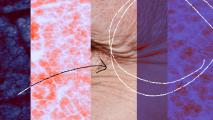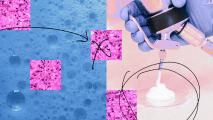New research sheds light on the brain’s ability to manage diabetes — scientists hope this could translate into treatments for people living with diabetes.
Living with diabetes is a lot of work. Most people with type 2 diabetes manage the condition by monitoring their blood sugar levels, diet, exercise, and insulin therapy — self-administered insulin injections into the fat under the skin. If it’s not properly managed, diabetes can lead to amputation or blindness, and it is one of the top ten causes of death in the U.S., according to the CDC.
Now, new research has found that a single surgical injection of a protein into the brain can restore blood sugar levels and send diabetes into remission — for rodents. Researchers are just starting to understand why.
Repairing Neural Networks Damaged by Diabetes
Previous work on rodents showed that one injection of a protein called fibroblast growth factor 1 (FGF1) could stabilize blood sugar levels for weeks, sometimes longer. Understanding how this happens could translate into human therapies for diabetes, mitigating the condition by harnessing the brain’s intrinsic ability to regulate blood sugar.
Yet much of the function behind that process remained unclear. But two new articles in Nature Communications and Nature Metabolism identify the complex dynamics of the brain’s reaction to FGF1.
“Until recently, the brain’s ability to normalize elevated blood sugar levels in diabetic animals was unrecognized,” Michael Schwartz, professor of medicine at the University of Washington School of Medicine, said. “Our international teams’ latest findings chart a path towards a more complete understanding how this effect is achieved.”
The research looked closely at the hypothalamus — the brain region that controls hunger and fullness signals and regulates blood sugar levels.
One study looked at changes in gene expression in brain cells before and after FGF1 injections. The other study investigated how the brain can maintain diabetic remission by looking at “perineuronal nets,” a group of neurons involved in blood sugar control. These neurons are scarce in the hypothalamus of diabetic rats, and more abundant in those with normal blood sugar levels. Together, the teams found that FGF1 restores diabetes-damaged perineuronal networks — something that is critical to maintaining diabetes remission.
Hope for Remission
More than 30 million U.S. adults are living with diabetes. It can cause severe complications like vision loss, stroke, amputation of toes or feet, and heart disease. It can be managed with a rigorous diet, exercise, and continuously monitoring blood sugar levels. But, for many, this regimen is stressful and difficult to maintain. This new research could help people with diabetes achieve long-term remission.
“These insights,” he said, “may one day inform therapeutic strategies for inducing sustained diabetes remission, rather than simply lowering blood sugar levels on a day-to-day basis as current treatments do,” Schwartz, who was an author on both studies, said.
There is hope for people living with diabetes. Research is getting creative: from using smartphones to detect diabetes, to finding ways to reverse the disease. The team thinks this work could lead to new ways of treating people living with diabetes and avenues for achieving long-term remission.
We’d love to hear from you! If you have a comment about this article or if you have a tip for a future Freethink story, please email us at [email protected].






